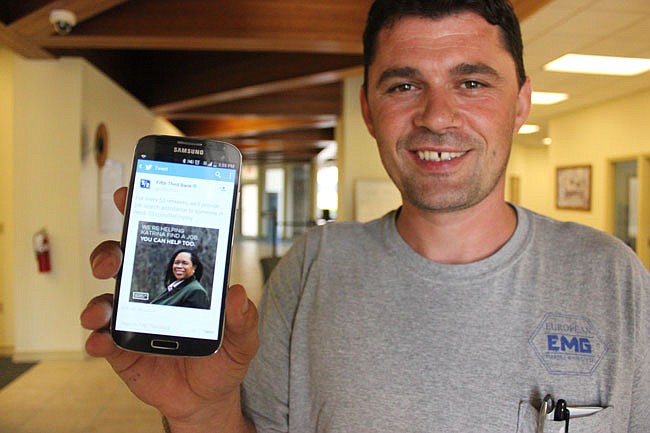- April 25, 2024
-
-
Loading

Loading

Barb Rose was in major debt. She got a second mortgage on her home and a credit card with a $25,000 limit was maxed out in a matter of two months when she let a family member use it to start a business. Then she lost her job.
“My phone was ringing off the wall with collectors calling, and I would have to tell them the same thing every time, there was nothing different to tell them, I mean I didn’t have the money, there was no money,” Rose said. “If I didn’t want to eat I could’ve paid them.”
Rose, a resident of Lehigh Acres in South Florida, was laid off in August 2012. Seven months later she was still looking for work, but then an unlikely company stepped up to help. The business she was in debt to, Fifth Third Bank, asked if she wanted some help finding a job. She asked if it was free. They said yes, so she did too. Two months later after nine months of unemployment, she landed her ideal job as a real estate office secretary.
Rose was a part of Fifth Third Bank’s Reemployment campaign. With the recession, the bank saw lots of customers losing their jobs and getting behind on their mortgages. There were options for refinancing and spreading payments over longer periods of time, but that didn’t get to the root of the issue — their customers needed jobs. So in 2012 Fifth Third partnered with company NextJob, identified customers who had lost their jobs, and offered them NextJob’s employment seeking service: one-on-one career coaching, an online educational toolkit and weekly webinars where coaches discuss frequent job seeking questions or skills – a $1,500 program, for free. Participants were out of work for an average of 22 months, but after six months using the program, 40 percent had jobs.
“We know that job loss is tough, it’s not just about your mortgage, that’s a small piece of it, it’s about these people’s lives and we want to help them,” said Stacie Haas, vice president and public relations manager at Fifth Third. “It enabled them to stay in their homes, to regain financial stability and to find their next job.”
Job seekers build relationships with the coaches, who motivate them to keep searching and see their value, which is what makes the program unique, said Christine Stiller, director of coaching for NextJob.
“We have had a number of Fifth Third job seekers who have called their coach before they called their wife to tell them that they got a job,” Stiller said.
They’ve since sponsored more than 200 customers to go through the program. Social media use is the new target of the campaign. They’ve selected three job seekers whose video resumes are on the campaign’s web site, and they’re asking the public to retweet their videos to expose them to as many job opportunities as possible. For every 53 retweets, Fifth Third will sponsor another person through the NextJob program.
“At the core, how do these people find jobs, they find jobs through their network … and I think that’s how today works to find a job,” said Maria Veltre, senior vice president and chief marketing officer for the bank. “Could we use the power of social networks … taking what is a great tried-and-true way of finding a job via networking we do today and take it to a different level in the social world.”
And Fifth Third isn’t the only way job seekers can find unexpected help. While CareerSource Central Florida is a first stop for many unemployed people for resume and job search help, they also offer a couple programs some might have overlooked. The youth program, for those ages 16 to 21, provides a paid internship for young people to learn job skills and expectations early on so that they are ready for the job market when they’re done with school. For skilled and professional workers they offer a work experience paid internship to gain hands-on experience after completing college or certifications.
Another organization that’s getting even further toward the root of the unemployment issue is the University of Central Florida’s GrowFL Economic Gardening program. It gives mid-size companies the tools to grow larger. They’re a disproportionately effective type of business to help because they account for just 8 percent of businesses yet produce 34 percent of net new jobs, said Tom O’Neal, executive director. Between the 2012 and 2013 fiscal years, it has helped create nearly 3,745 net new jobs in the state of Florida, which equates to $587 million added to Florida’s economy and nearly $20 million more in state and local tax revenues.
“If you help create successful companies, everything else takes care of itself, because they’re the ones that hire new people and create new products,” O’Neal said.
So it’s likely that looking into a local, mid-size business — and not that big box corporation — could be the key to finding your next job.